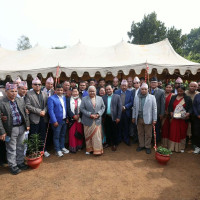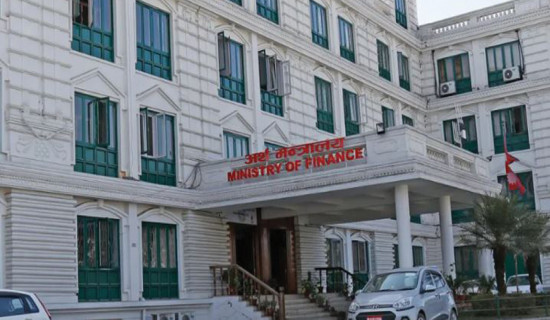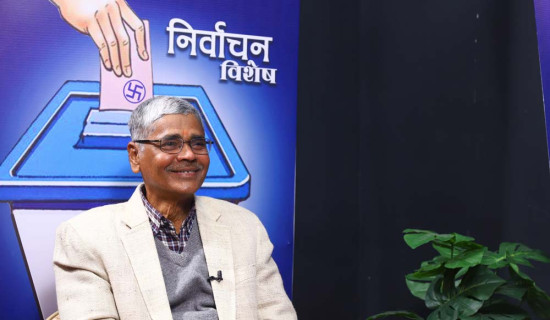- Tuesday, 3 February 2026
Give Teachers Due Recognition
The present teachers' movement has reshaped public perception about the relationship between the government authorities and education by highlighting the fault lines between centralisation and professional autonomy. This movement has also triggered widespread debate about the role of the government in safeguarding the integrity of educational institutions. This movement has also redefined how the public views the government's responsibility to education, raising concerns about accountability, fairness and professional integrity of teachers.
A teacher is a guide who helps society to continuously improve its moral standard, economic prosperity, intellectual growth and a broad range of social skills that enable an individual to lead a fulfilling life. Many intellectuals have defined education in several different ways. Interestingly, most of them have explained it as a process which nurtures rational understanding of the world, forges sceptical views on world events and promotes intellectual autonomy. Famous educator Paulo Freire says that education should free individuals from ignorance and oppression, empowering them to question and change the world. Emanuel Kant has also stressed on education in reinforcing moral standards and intellectual competence of the society.
Professional communities
A society comprises a number of professional communities to provide expert solutions to different societal issues that affect the normal functioning of social mechanisms required for the healthy interaction among social disciplines. Teachers are, in fact, the facilitators of society who constantly work to create an effective interface, making it possible for wider society to encapsulate higher values through the cultivation of an overarching cultural rainbow of empathy and understanding.
Teachers are, therefore, moral standard bearers whose standing and status provide direction and bearing to the wayfarers on the journey of life. However, it must be admitted that the status and recognition of teachers are quite low in the societies of developing and underdeveloped countries. Nepal is one of these countries where society rarely acknowledges the distinct role teachers play in society. It can be said that the status of teachers and the society's intellectual level are not proportional. In our country, society views teachers as mere service givers, often placing an undue expectation beyond the capacity of the existing infrastructure and resources that can provide them.
Teachers of developing countries resort to protest because of their harrowing experiences of unjust and undignified treatment at the hands of the authorities and the general public. They are mostly underpaid, forced to work extra hours and without adequate emoluments for their contribution toward the enhancement of the cultural life of the society. Despite being the trailblazers of society, they are undervalued, their voices ignored and their interests and dignity undermined. At a policy level, their advice is seldom solicited. They are often held accountable for the poor intellectual performance of the students, and are blamed for social issues like dearth of emotional intelligence, cultural intolerance, or poor innovation in the society.
Teachers are working under duress without proper material resources, inadequate training and opportunity for sharing prevailing best practices in the field of education. Our society is also discriminatory against educational disciplines. Educational disciplines like medicine, engineering and chartered accountancy are accorded priority and more value than multi-disciplinary disciplines. Society rarely realises that education is a constant process for building social values through inculcating relational values, appropriate conduct and cultural sensitivities in cross-cultural environments. When society treats teachers as hired technical hands and fails to grasp the quintessential values of education, conflict emerges.
The teachers' protest movement, which had started in September, has now been settled through a nine-point agreement signed between the relevant government authorities and the Nepal Teachers' Federation (NFT) on Wednesday. The conflict between the government and the teaching community is mostly related to job security, lack of comparable status of teachers with administrative government servants, professional autonomy and dignified status for the teaching profession. In public perception, these demands were perfectly rational and necessary.
The month-long teachers' agitation disrupted the academic process of the whole country, created suspicion on the government and threatened to escalate into a major law and order problem as a cumulating factor of already tense social-political situation. During the Panchayat era, the professional communities clashed with the government. The teachers' movement was also endemic at that time. During those years, teachers were not only fighting for their professional rights, they were also playing the role of torchbearers of the democratic movement.
Now the situation has changed, and there is an elected democratic government in place. However, the educational field has not been in shipshape following the 1990 People's Movement. Before 1990, public education formed the backbone of school and campus education. Successive elected democratic governments stressed on privatisation of academic institutes without paying attention to resources, control mechanisms, professional autonomy and job security. The prevailing education policy has triggered division between public and private schools. Public school teachers enjoy better pay, stable jobs and enjoy more preferential package of incentives and retirement benefits, while private school teachers are still exploited by owners, keeping them insecure and vulnerable to policy changes, mostly whimsical, undermining the broad interest of the teaching community.
Right thing
The teachers have, therefore, done the right thing by going to the street, reminding the government that no democratic reform towards prosperity and social-cultural transformation will succeed until issues of education sector reform are addressed first. This movement should not have been prolonged so long in the context of worsening social and political instability brought about by regressive forces trying to re-enact their comeback and growing political contradictions running deeper with each passing day.
The government of KP Sharma Oli has taken much-needed conciliatory steps, which must be taken as a bold initiative to motivate agitating teachers to return to the classroom. We have the stereotypical view that all agitations are anti-social and anti-establishment if they take place under a democratic dispensation. This is not true. Even democratic governments can deviate from the path of public interest and may unwittingly play into the hands of educational brokers and corporate houses. The society and the educational authorities must, therefore, understand that when the teachers come to the street, it is not always for a bad cause.
(Dr. Bharadwaj is former ambassador and chairperson of Gorkhapatra Corporation bharadwajnarad@gmail .com)
















